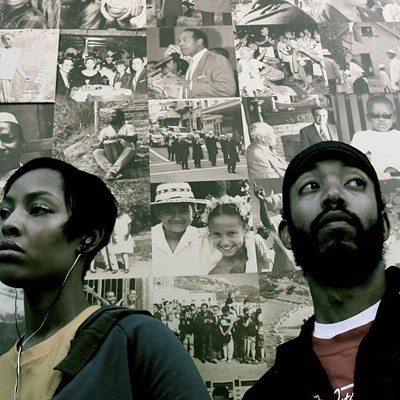But even well-traveled sophisticates like Collins take at least something away from a Sonoran excursion. Discussing his only prior visit to the Pueblo, Collins describes the scene: "Yeah, it was like a cartoon; we were standing there, and there was a saguaro, and railroad tracks, and that's pretty much it. Then all of a sudden, it was like 'Hey, check it out, a tumbleweed!' (laughs)."
With a revolving cast of players, Mick Collins has been making raw, passionate, underground rock music for nearly two decades in his hometown of Detroit. A former network administrator and self-described "would-be computer geek," Collins formed the Dirtbombs in the early '90s, if only conceptually at first--he had an idea for a soul-influenced band that would emphasize the big bottom by utilizing two bass players and two drummers.
During the Dirtbombs' nascency, Collins was rocking shabby clubs the world over with the seminal garage group the Gories, without whose trailblazing efforts we might still be listening to iterations of Temple of the Dog (wait a second ... ). For a reference to the significance of the Gories, see nearly any White Stripes article from the last two years. When Jack White isn't dodging questions about his slap-fight with Von Bondies singer Jason Stollsteimer, he's praising Collins for inspiring him.
In 2004, praise from Jack White is the coin of the rock realm. But it leads to false constructions of a Detroit "scene" which are frequently as speculative and incorrect as notions of "team chemistry" or "weapons of mass destruction."
"If there was a 'Detroit Scene,' we'd tell you all about it," says Collins. However, there's not. "It's a nice media delusion, but that's about all it is," reads the FAQ page on the Dirtbombs' Web site. Also annoying to them: any use of the word "garage." "We're a rock band," Collins avers. "Plain and simple."
Such a statement holds more water than, uh, some kind of large water container. Dangerous Magical Noise, released in late 2003, is a buzz-heavy beast of blues-and-soul-tinted rock that practically begs to be played on the radio. From Collins' Hendrix-esque vocals to the raunchy crunch of his guitar layered over a super-sized rhythm section, the Dirtbombs make their Rock 101 lesson seem effortless, in effect, saying, "This is how it's done, chumps," by using the universal language of well-constructed rock riffage.
A serious record collector, Collins draws on his expansive knowledge of the rock idiom to add complexity to his oeuvre, whether it's by releasing an incredibly well-rendered album of soul classics (2001's Ultraglide in Black) or by covering Robyn Hitchcock's "Executioner of Love" on Dangerous Magical Noise. And the sampled crowd noise on Noise's leadoff track, "Start the Party"--a ringer for the kind of screaming heard on Hard Day's Night--actually has a comically dorky pedigree.
"You're the first person to ask where that came from," Collins says. "Now I'm all the more embarrassed about it (laughs). I think it's from Around the World With the Osmonds (laughs). ... I don't think it's Live Phase-III; I think it's Around the World With. It's from the Osmond '73 tour. What's interesting about it is when we were trying to find it, that's exactly how it sounded on the record, like every time somebody did something, the crowd would erupt with the exact same screams," Collins chuckles, exposing his record-collecting geekery in perhaps greater detail than he'd like.
In a digression in the interview, talk turned to baseball due to Collins' professed disdain for it. He clarifies his position: "There's no clock. I don't like any sport that doesn't have a clock. ... I mean, playoffs are different. I will actually watch the playoffs. I will watch a baseball game if it's past the seventh inning. I really can't be bothered for the first six.
"I like a lot of European sports, I like European soccer, because they have relegation. Relegation is where all the different leagues of the sport in the country are sort of tied together. And if a team has a really good season, they'll be boosted up into a higher league. If a team has a really crappy season, they get knocked down. I think American baseball would benefit greatly from relegation."
Hmm. Perhaps relegation might work on the municipal level as well. Maybe if our scrappy little Tucson continues to hustle, and Phoenix continues being Phoenix, they should be relegated. Let them be "minor league" for a while. And maybe this time through, Mick Collins will leave with more than a tumbleweed to remember us by. A town can dream.










